GALLUP NEWS SERVICE
PRINCETON, NJ -- The pro-immigrant rallies of this past weekend have the GOP members of Congress on the defensive to come up with a more lenient approach for dealing with illegal immigrants than the one approved by the U.S. House of Representatives last December. That bill called for building a fence along hundreds of miles of the U.S.-Mexican border, increasing other border controls, making felons of immigrants who are here illegally, and making felons of the employers that hire them. The U.S. Senate is now trying to fashion a broader bill that tones down the penalties, and also addresses the status of the 11 million illegal immigrants living in the United States.
In many respects, the original House legislation is in step with Americans' thinking on immigration. When asked where government should focus its energies on immigration, Americans are more concerned that steps be taken to halt the flow of immigrants slipping in at the border than they are that the government develop a plan for dealing with the illegal immigrants already living here. Americans also favor many of the more severe remedies for thwarting illegal immigration included in the House bill.
Border Control Seen as More Urgent
While a majority of Americans believe both approaches to dealing with illegal immigration are important, only a third (34%) say it is "extremely important" to develop a plan to deal with the large number of illegal immigrants currently living here, while 43% say it is extremely important to tighten up the borders.
Factoring in those who say each is very important, 79% say controlling the borders is important, while 75% say this about developing a comprehensive strategy for illegal immigrants already in the country.
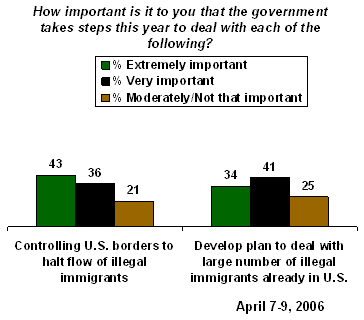
A Harsh Prescription
Americans believe the most effective way to reduce illegal immigration is to cut off the employment incentive for coming here by instituting tough penalties for businesses that hire illegal immigrants. More than half think this would be "very effective," and another 32% say it would be "somewhat effective."
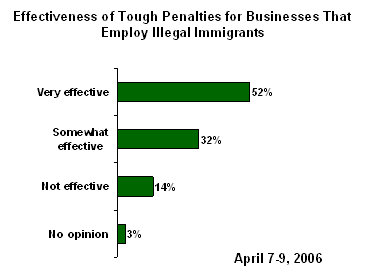
The vast majority of Americans also see value in beefing up the number of border control officers: 37% call this very effective and 44% say it is somewhat effective. Majorities also say that preventing illegal immigrants from using American schools and hospitals and working to raise the standard of living in illegal immigrants' home countries would also help to reduce the number of illegal immigrants coming here.
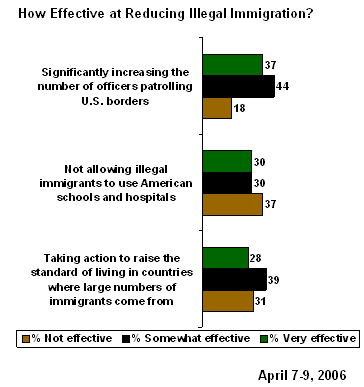
In a separate pair of questions, Gallup finds majority support for making illegal immigration a crime, and for making it a crime to knowingly assist an illegal immigrant.
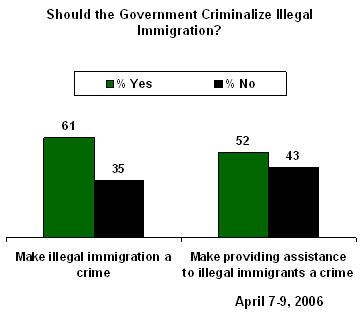
The one Republican-oriented proposal Americans question is the idea of building a wall along the border with Mexico. Only 18% consider this very effective, with an additional 30% calling it somewhat effective. Close to half say it would be either not too or not at all effective.
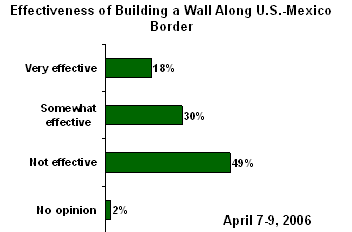
Bottom Line
Previous Gallup polling has shown that immigration is relatively low on Americans' list of priorities for what they want the president and Congress to be working on. In a January poll, immigration ranked dead last out of seven possible issues -- well behind the Iraq war, healthcare, and the economy. But as long as Congress is focusing on the issue, the public is fairly clear in its preferred emphasis on border control; fewer think it's extremely important to develop a broader plan to resolve the status of existing illegal immigrants, though both goals are seen as important.
Illegal immigrants are understandably eager for legislation that will resolve their legal status once and for all, and from their standpoint, in a way that provides them a reasonable path to legal residency or citizenship. To the extent Congress addresses this, Americans would set a fairly high bar for allowing illegal immigrants to remain here. As highlighted in Gallup Editor David W. Moore's April 12, 2006 article on immigration, a majority of Americans are willing to allow existing illegal immigrants to remain in the United States, rather than deport them. But they widely favor a number of prerequisites that represent impossible hurdles for many immigrants: paying all back taxes owed on past income, paying a fine for coming here illegally, and demonstrating U.S. residency for at least five years.
In the absence of the Republicans' conservative base rising up to support the GOP's efforts to stiffen policies toward illegal immigration, the question for this fall's election is whether the more energized and vocal pro-immigrant groups seen this past weekend will effectively punish the Republicans for even considering this course of action.
Survey Methods
These results are based on telephone interviews with a randomly selected national sample of 1,004 adults, aged 18 and older, conducted April 7-9, 2006. For results based on this sample, one can say with 95% confidence that the maximum error attributable to sampling and other random effects is ±3 percentage points. In addition to sampling error, question wording and practical difficulties in conducting surveys can introduce error or bias into the findings of public opinion polls.14. How important is it to you that the government takes steps this year to deal with each of the following -- extremely important, very important, moderately important, or not that important? How about -- [RANDOM ORDER]?
A. Controlling U.S. borders to halt the flow of illegal immigrants into the U.S.
|
|
Extremely important |
Very important |
Moderately important |
Not that |
No |
|
% |
% |
% |
% |
% |
|
|
2006 Apr 7-9 |
43 |
36 |
17 |
4 |
1 |
B. Developing a plan to deal with the large number of illegal immigrants who are already living in the U.S.
|
|
Extremely important |
Very important |
Moderately important |
Not that |
No |
|
% |
% |
% |
% |
% |
|
|
2006 Apr 7-9 |
34 |
41 |
20 |
5 |
* |
|
* Less than 0.5% |
|||||
20. How effective do you think each of the following would be as a way to reduce illegal immigration to the United States -- very effective, somewhat effective, not too effective, or not at all effective? How about -- [RANDOM ORDER]?
BASED ON 489 NATIONAL ADULTS IN FORM B
|
2006 Apr 7-9 |
Very effective |
Total effective |
Total |
|
% |
% |
% |
|
|
Instituting tough penalties for businesses that employ illegal immigrants |
52 |
84 |
14 |
|
Significantly increasing the number of officers patrolling U.S. borders |
37 |
81 |
18 |
|
Not allowing illegal immigrants to use American schools and hospitals |
30 |
60 |
37 |
|
Taking action to raise the standard of living in countries where large numbers of immigrants come from |
28 |
67 |
31 |
|
Building a wall along the border with Mexico |
18 |
48 |
49 |
Full Results: Effectiveness of U.S. Efforts Against Illegal Immigration
A. Building a wall along the border with Mexico
|
Very effective |
Somewhat effective |
Not too effective |
Not at all effective |
No |
|
|
% |
% |
% |
% |
% |
|
|
2006 Apr 7-9 |
18 |
30 |
19 |
30 |
2 |
B. Not allowing illegal immigrants to use American schools and hospitals
|
Very effective |
Somewhat effective |
Not too effective |
Not at all effective |
No |
|
|
% |
% |
% |
% |
% |
|
|
2006 Apr 7-9 |
30 |
30 |
20 |
17 |
3 |
C. Significantly increasing the number of officers patrolling U.S. borders
|
Very effective |
Somewhat effective |
Not too effective |
Not at all effective |
No |
|
|
% |
% |
% |
% |
% |
|
|
2006 Apr 7-9 |
37 |
44 |
13 |
5 |
1 |
D. Instituting tough penalties for businesses that employ illegal immigrants
|
Very effective |
Somewhat effective |
Not too effective |
Not at all effective |
No |
|
|
% |
% |
% |
% |
% |
|
|
2006 Apr 7-9 |
52 |
32 |
9 |
5 |
3 |
E. Taking action to raise the standard of living in other countries
|
Very effective |
Somewhat effective |
Not too effective |
Not at all effective |
No |
|
|
% |
% |
% |
% |
% |
|
|
2006 Apr 7-9 |
28 |
39 |
16 |
15 |
3 |
19. How important is it to you that the president and Congress deal with each of the following issues in the next year -- is it -- extremely important, very important, moderately important, or not that important? How about -- [RANDOM ORDER]?
|
2006 Jan 20-22 |
Extremely |
Extremely/Very important |
|
% |
% |
|
|
The situation in Iraq |
58 |
92 |
|
Terrorism |
57 |
89 |
|
Healthcare policy |
47 |
86 |
|
The economy |
46 |
87 |
|
Corruption in government |
45 |
82 |
|
The problems caused by Hurricane Katrina |
35 |
71 |
|
Immigration |
31 |
64 |
